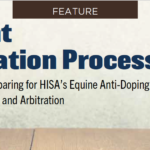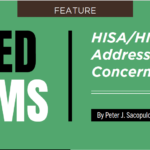Prior to May 22,2023, positive drug test results in horse racing were adjudicated by state racing commissions. Typically, the process was a merit hearing conducted by an administrative law judge followed by the right of judicial review in district court after exhaustion of administrative remedies. This system has been completely changed by the Horseracing Integrity and Safety Authority (HISA) rules for alleged Anti-Doping and Medication Control (ADMC) violations. That system has, as its basis, arbitration.
Arbitration is one of the most common forms of alternative dispute resolution (ADR), in which disputes are handles outside of trial courts. HISA’s adjudication rules require all alleged ADMC violations to be arbitrated. While mediation, another common form of ADR, is informal and allows the parties to select a neutral mediator and negotiate a settlement typically for a cost of less than $2,500, arbitration is quite different in that a neutral, trained arbitrator serves as judge responsible for resolving a dispute. HISA does not provide for or allow mediation, nor do HISA’s rules allow for a dispute to be tried by a jury in a civil court of law – a right guaranteed by the Seventh Amendment of the U.S. Constitution.
One of the main selling points for arbitration is that it is less costly than adjudicating a matter in a civil court of law. However, under HISA’s adjudication scheme, that is not the case. In fact, one of the first cases from HISA and the Horseracing Integrity and Welfare Unit (HIWU) that was arbitrated involved an international arbitrator. In that case, HISA/HIWU flew a Canadian arbitrator to Florida to conduct the hearing. The cost for the arbitrator was nearly $15,000 for one of professional services. This, of course, was in addition to legal and expert fees. HISA’s arbitration process is no cost savings to the Thoroughbred horseman.
To illustrate the HISA arbitration process, assume a trainer is alleged to have an equine anti-doping (EAD) violation. How does the arbitration process work, and what should that trainer do in their defense?
If the trainer/covered person requests a hearing, the matter is assigned an arbitrator or panel of arbitrators. Also, within 14 days of requesting a hearing, the covered person is required to submit a pre-hearing submission. That submission include the identity of witnesses, lay and expert, to be called on behalf of the covered person and the anticipated testimony of each. Additionally, the submission must include any documents that the covered person intends to introduce in support of their defense. Fourteen days thereafter, HISA/HIWU is required to submit a response to the covered person’s written submission. The arbitration hearing must then be conducted within 50 days of the hearing request.
Once file, the administration complaint is assigned to a HISA-selected arbitrator. The covered person has no input in selecting the arbitrator. Significantly, HISA’s rules regarding arbitration are not consistent with the American Arbitration Association rules. For example, under HISA, arbitration is mandatory and binding; the covered person has no rights to a trial by jury. The American Arbitration Association rules allow the parties the right to decide which issues are to be arbitrated. Under HISA, the covered person has no say in which issues will be subject to arbitration. Finally, and perhaps most importantly, the covered person has no input regarding which rules will govern the arbitration process.
Arbitration of the pending alleged violation is required to be conducted within 60 days. Therefore, the covered person must immediately seek and retain counsel and, most likely, an expert witness or witnesses. They also must secure laboratory test results as well as the results from any confirmatory test and provide those results and investigative information to the expert or experts. Counsel for the trainer will, within this time frame, need to interview witnesses, meet and consult with expert witnesses and prepare defense strategy. All of this must take place within a very limited time.
In defending the allegations, the counsel in a civil arbitration is not afforded the right to conduct discovery. Discovery consists of written questions that must be answered under oath, known as interrogatories, as well as requisitions for production of documents and requests for admissions. Additionally, in a civil action, the defendant/covered person is afforded the right to take depositions of both lay and expert witnesses. Under HISA’s adjudication system, the covered person’s rights to serve discovery and/or depots witnesses, lay or expert, have been taken away and denied. And, if the HISA-selected arbitrator or panel or arbitrators decides, as has been done in previous cases, to utilize the World Anti-Doping Code rather than the Federal Rules of Evidence, the covered person’s ability to dispute and contest the qualifications and testimony of HIWU’s experts is significantly restricted. These rules create an unloved playing field for adjudication of alleged EAD violations.
The arbitrator or arbitral body is required to issue a decision within 14 days of the completion of arbitration. If the decision is adverse, the covered person may appeal the decision of the arbitrator to the Federal Trade Commission (FTC). The appeal, known as a request for review under HISA, even if filed in a a timely manner, does not guarantee a review by the FTC. Such a review is discretionary. If the FTC decides not to approve the request for review, the arbitrator’s decision is final, and the next step is an appeal to the U.S. Court of Appeals.
As stated earlier, the HISA adjudication system provides for arbitration but not trial by jury. The 5th U.S. Circuit Court of Appeals, the same court that will decide the National HBPA’s constitutional challenge regarding HISA, has rules that one facing a monetary penalty is entitled to a trial by jury (Securities and Exchange Commission v. Jarkesy, 22-859, 5th Cir.). Those challenging HISA are optimistic this same court and the U.S. Supreme Court will rule HISA unconstitutional.
—–
Originally written by Horseman’s Journal, Winter 2023






